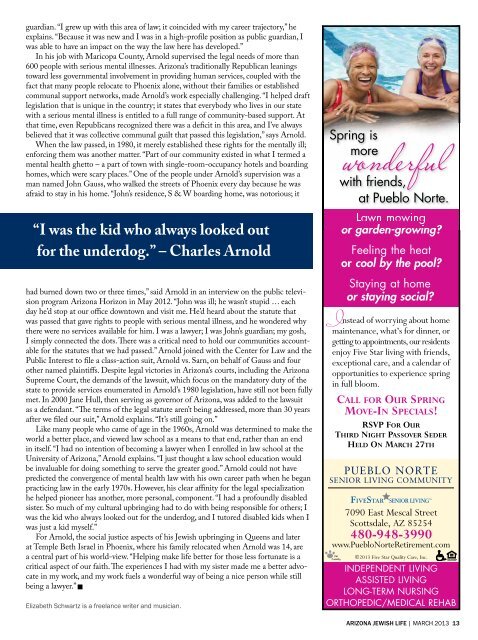AZJL_Mar13
AZJL_Mar13
AZJL_Mar13
Create successful ePaper yourself
Turn your PDF publications into a flip-book with our unique Google optimized e-Paper software.
guardian. “I grew up with this area of law; it coincided with my career trajectory,” he<br />
explains. “Because it was new and I was in a high-prole position as public guardian, I<br />
was able to have an impact on the way the law here has developed.”<br />
In his job with Maricopa County, Arnold supervised the legal needs of more than<br />
600 people with serious mental illnesses. Arizona’s traditionally Republican leanings<br />
toward less governmental involvement in providing human services, coupled with the<br />
fact that many people relocate to Phoenix alone, without their families or established<br />
communal support networks, made Arnold’s work especially challenging. “I helped draft<br />
legislation that is unique in the country; it states that everybody who lives in our state<br />
with a serious mental illness is entitled to a full range of community-based support. At<br />
that time, even Republicans recognized there was a decit in this area, and I’ve always<br />
believed that it was collective communal guilt that passed this legislation,” says Arnold.<br />
When the law passed, in 1980, it merely established these rights for the mentally ill;<br />
enforcing them was another matter. “Part of our community existed in what I termed a<br />
mental health ghetto – a part of town with single-room-occupancy hotels and boarding<br />
homes, which were scary places.” One of the people under Arnold’s supervision was a<br />
man named John Gauss, who walked the streets of Phoenix every day because he was<br />
afraid to stay in his home. “John’s residence, S & W boarding home, was notorious; it<br />
“I was the kid who always looked out<br />
for the underdog.” – Charles Arnold<br />
had burned down two or three times,” said Arnold in an interview on the public television<br />
program Arizona Horizon in May 2012. “John was ill; he wasn’t stupid … each<br />
day he’d stop at our oce downtown and visit me. He’d heard about the statute that<br />
was passed that gave rights to people with serious mental illness, and he wondered why<br />
there were no services available for him. I was a lawyer; I was John’s guardian; my gosh,<br />
I simply connected the dots. ere was a critical need to hold our communities accountable<br />
for the statutes that we had passed.” Arnold joined with the Center for Law and the<br />
Public Interest to le a class-action suit, Arnold vs. Sarn, on behalf of Gauss and four<br />
other named plaintis. Despite legal victories in Arizona’s courts, including the Arizona<br />
Supreme Court, the demands of the lawsuit, which focus on the mandatory duty of the<br />
state to provide services enumerated in Arnold’s 1980 legislation, have still not been fully<br />
met. In 2000 Jane Hull, then serving as governor of Arizona, was added to the lawsuit<br />
as a defendant. “e terms of the legal statute aren’t being addressed, more than 30 years<br />
after we led our suit,” Arnold explains. “It’s still going on.”<br />
Like many people who came of age in the 1960s, Arnold was determined to make the<br />
world a better place, and viewed law school as a means to that end, rather than an end<br />
in itself. “I had no intention of becoming a lawyer when I enrolled in law school at the<br />
University of Arizona,” Arnold explains. “I just thought a law school education would<br />
be invaluable for doing something to serve the greater good.” Arnold could not have<br />
predicted the convergence of mental health law with his own career path when he began<br />
practicing law in the early 1970s. However, his clear anity for the legal specialization<br />
he helped pioneer has another, more personal, component. “I had a profoundly disabled<br />
sister. So much of my cultural upbringing had to do with being responsible for others; I<br />
was the kid who always looked out for the underdog, and I tutored disabled kids when I<br />
was just a kid myself.”<br />
For Arnold, the social justice aspects of his Jewish upbringing in Queens and later<br />
at Temple Beth Israel in Phoenix, where his family relocated when Arnold was 14, are<br />
a central part of his world-view. “Helping make life better for those less fortunate is a<br />
critical aspect of our faith. e experiences I had with my sister made me a better advocate<br />
in my work, and my work fuels a wonderful way of being a nice person while still<br />
being a lawyer.” <br />
Elizabeth Schwartz is a freelance writer and musician.<br />
Spring is<br />
more<br />
wonderful<br />
with friends,<br />
at Pueblo Norte.<br />
Lawn mowing<br />
or garden-growing?<br />
Feeling the heat<br />
or cool by the pool?<br />
Staying at home<br />
or staying social?<br />
Instead of worrying about home<br />
maintenance, what’s for dinner, or<br />
getting to appointments, our residents<br />
enjoy Five Star living with friends,<br />
exceptional care, and a calendar of<br />
opportunities to experience spring<br />
in full bloom.<br />
CALL FOR OUR SPRING<br />
MOVE-IN SPECIALS!<br />
RSVP FOR OUR<br />
THIRD NIGHT PASSOVER SEDER<br />
HELD ON MARCH 27TH<br />
PUEBLO NORTE<br />
SENIOR LIVING COMMUNITY<br />
7090 East Mescal Street<br />
Scottsdale, AZ 85254<br />
480-948-3990<br />
www.PuebloNorteRetirement.com<br />
Pet<br />
Friendly<br />
©2013 Five Star Quality Care, Inc.<br />
INDEPENDENT LIVING<br />
ASSISTED LIVING<br />
LONG-TERM NURSING<br />
ORTHOPEDIC/MEDICAL REHAB<br />
ARIZONA JEWISH LIFE | MARCH 2013 13


